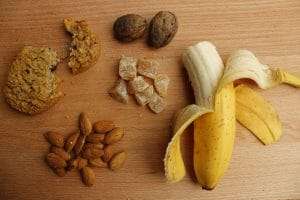Introduction
Maintaining consistent energy levels throughout the day has become a significant challenge. Many people rely on caffeine-laden beverages like coffee, energy drinks, and sodas for quick energy fixes, leading to a cycle of energy spikes and crashes that can leave you feeling more depleted than before. However, there’s a healthier, more sustainable approach to energize your body and mind: strategic nutrition that provides steady, long-lasting energy without the drawbacks of caffeine.
This comprehensive guide explores the science behind energy production in the body and introduces you to a variety of nutrient-dense foods that can help you maintain optimal energy levels naturally. We’ll explore the complex interplay between macronutrients, micronutrients, and energy metabolism, providing evidence-based strategies to help you overcome fatigue and sustain vitality throughout your busy day.
Whether you’re looking to reduce your caffeine dependence, address chronic fatigue, or simply optimize your nutrition for better energy management, this article offers practical, science-backed solutions that you can implement immediately. By understanding how different foods affect your energy levels and incorporating the right combinations into your diet, you can transform your relationship with food and harness its power as your most reliable energy source.
Understanding Energy Production in the Body
The Biochemistry of Energy
Before exploring specific energy-boosting foods, it’s essential to understand how our bodies actually produce and utilize energy. At the cellular level, energy production primarily occurs within mitochondria—often called the “powerhouses” of cells—through a process known as cellular respiration.
This complex biochemical process converts the nutrients from food into adenosine triphosphate (ATP), the universal energy currency of cells. The food we eat—specifically carbohydrates, proteins, and fats—provides the raw materials needed for ATP production [1]. While carbohydrates are the body’s preferred and most efficient energy source, proteins and fats also play crucial roles in sustained energy production, especially during periods of fasting or extended physical activity.
The rate and efficiency of ATP production depend on numerous factors, including the types of nutrients consumed, micronutrient availability, hormonal balance, hydration status, and overall metabolic health. Energy boost by optimizing these factors through strategic nutrition, we can enhance energy production and maintain stable energy levels throughout the day.
The Energy Crash Cycle
Many people find themselves trapped in an energy crash cycle, characterized by dramatic fluctuations in energy levels throughout the day. This cycle often begins with consuming quick-energy foods or beverages (like caffeine or simple sugars) that cause a rapid spike in blood glucose and temporary energy elevation, followed by an equally rapid crash as insulin clears glucose from the bloodstream.
Research published in the Journal of Clinical Endocrinology & Metabolism demonstrates that these blood sugar fluctuations not only impact immediate energy levels but can also lead to increased hunger, impaired cognitive function, and long-term metabolic consequences [2]. Breaking this cycle requires a fundamental shift toward foods that provide steady, sustained energy release.
Complex Carbohydrates: The Foundation of Sustained Energy
Whole Grains: Nature’s Time-Release Energy Capsules
Whole grains represent one of the most effective dietary strategies for maintaining sustained energy levels. Unlike their refined counterparts, whole grains contain the complete grain kernel (the bran, germ, and endosperm) preserving their fiber content and nutrient profile. This structure results in a slower digestion process and more gradual glucose release into the bloodstream.
A meta-analysis published in BMJ found that higher whole grain consumption was associated with reduced risk of several chronic diseases and better overall energy metabolism [3]. Particularly energy-enhancing whole grain options include:
Oats: Rich in beta-glucan fiber that slows digestion and stabilizes blood sugar levels, oats provide sustained energy for hours after consumption. A study in the Journal of Nutrition showed that oat consumption led to better sustained energy and cognitive performance compared to refined grain alternatives [4].
Quinoa: This complete protein source contains all nine essential amino acids along with complex carbohydrates, making it an exceptional energy-sustaining food. Its relatively high iron content also supports oxygen transport throughout the body, a crucial factor in energy production.
Buckwheat: Despite its name, buckwheat isn’t related to wheat but is a seed high in resistant starch and magnesium, a mineral that plays a key role in converting food into energy. Research indicates that buckwheat may help improve insulin sensitivity and glucose response, contributing to more stable energy levels throughout the day [5].
Brown rice: With its fiber-rich bran layer intact, brown rice releases energy gradually while providing essential B vitamins needed for energy metabolism.
When incorporating whole grains into your diet for energy purposes, aim for 1/2 to 1 cup per serving, preferably paired with protein or healthy fats to further slow digestion and prolong energy release.
Legumes: The Overlooked Energy Powerhouses
Legumes, including beans, lentils, peas; and chickpeas, represent another exceptional category of complex carbohydrates for sustained energy. Their unique combination of protein, complex carbohydrates, and fiber creates an ideal trifecta for long-lasting vitality.
A systematic review published in Nutrients examined the impact of legume consumption on various health parameters and found significant benefits for energy metabolism, blood glucose regulation, and satiety [6]. The high fiber content in legumes (averaging 7-8 grams per 1/2 cup) dramatically slows their digestion, resulting in a steady glucose release that can sustain energy levels for up to 4-5 hours after consumption.
Some particularly energy-enhancing legumes include:
Lentils: Offering an impressive combination of 9 grams of protein and 8 grams of fiber per 1/2 cup (cooked), lentils also provide iron, which helps transport oxygen throughout the body, crucial for energy production.
Black beans: Rich in resistant starch, black beans feed beneficial gut bacteria that produce short-chain fatty acids, which can serve as an alternative energy source for the body.
Chickpeas: Beyond providing sustained energy through their carbohydrate-protein-fiber matrix, chickpeas contain significant amounts of manganese, a mineral that functions as a cofactor in energy-producing enzymatic reactions.

For maximum energy benefits, aim to include 1/2 to 1 cup of legumes in your diet daily, perhaps as a replacement for more refined carbohydrate sources.
Glam Dust
Radiant Skin – Luscious Hair – Pristine Nails
Vitamin Shots
The ultimate brain and body supplements
Vitamin Sprinkles
The ultimate brain and body supplements
Proteins: The Building Blocks of Sustained Energy
Complete Proteins for Optimal Energy Production
Protein plays a multifaceted role in energy metabolism beyond simply providing calories. It helps maintain and build lean muscle mass (which increases metabolic rate), stabilizes blood sugar levels when consumed with carbohydrates, and provides the amino acids necessary for synthesizing energy-regulating hormones and enzymes.

Research published in Advances in Nutrition indicates that adequate protein consumption can significantly impact perceived energy levels and fatigue resistance [7]. Complete proteins, which contain all nine essential amino acids, are particularly valuable for energy production. While animal sources naturally provide complete proteins, strategic combinations of plant proteins can achieve similar benefits for those following plant-based diets.
Energy-enhancing protein sources include:
Eggs: Beyond providing high-quality complete protein (about 6g per egg), eggs are rich in B vitamins, particularly B12, which plays a critical role in energy metabolism. The combination of protein and fat in eggs makes them particularly satiating and energy-sustaining.
Greek yogurt: With approximately twice the protein of regular yogurt (15-20g per cup), Greek yogurt provides sustained energy while also delivering probiotics that support gut health, an often-overlooked aspect of energy production and nutrient absorption.
Tempeh: This fermented soybean product offers a complete protein profile (about 16g per 3-ounce serving) along with probiotics from the fermentation process. Its combination of protein, fiber, and healthy fats makes it exceptionally energy-sustaining.
Hemp seeds: Containing all nine essential amino acids and a perfect 3:1 ratio of omega-6 to omega-3 fatty acids, hemp seeds provide highly digestible protein (about 10g per 3 tablespoons) along with magnesium, which is crucial for energy-producing enzymatic reactions.

For optimal energy levels, nutrition research suggests consuming 15-30g of protein per meal, depending on your body size and activity level, with some protein included in each meal and snack throughout the day [8].
Healthy Fats: The Sustained Energy Secret – Long-lasting boosters
Energy-Dense Without the Crash
While fats have been vilified in past decades, nutrition science now recognizes certain fats as essential for optimal energy metabolism and overall health. Gram for gram, fats provide more than twice the energy of carbohydrates or proteins (9 calories per gram versus 4), making them the most energy-dense macronutrient. More importantly, they’re digested slowly, providing sustained energy without blood sugar spikes and crashes.
A study published in the Journal of the International Society of Sports Nutrition demonstrated that athletes trained to utilize fat as a primary energy source could sustain performance for longer periods without the need for constant refueling [9]. While this metabolic adaptation takes time, incorporating the right fats into your diet can help optimize your body’s ability to use this abundant energy source.
Energy-enhancing healthy fat sources include:
Avocados: Rich in monounsaturated fats, avocados also provide fiber and potassium—an electrolyte crucial for proper muscle function and energy production. Research suggests that their unique fat profile may help improve mitochondrial function.
Nuts and seeds: Walnuts, almonds, chia seeds, and flaxseeds provide various combinations of omega-3 fatty acids, protein, and fiber that contribute to sustained energy release. A study in the Journal of Nutrition found that regular nut consumption was associated with reduced fatigue and improved energy levels [10].
Olive oil: The primary fat in the Mediterranean diet, olive oil is rich in oleic acid, a monounsaturated fat that research has linked to improved mitochondrial function and reduced inflammation—both important factors in optimal energy production.
Coconut: Containing medium-chain triglycerides (MCTs), coconut products provide fats that can be quickly converted to energy without requiring the complex digestive processes of longer-chain fats, making them unique for both quick and sustained energy.
For energy optimization, aim to include 1-2 tablespoons of healthy oils or 1/4 cup of nuts/seeds or 1/2 an avocado daily, distributed across meals and snacks.
Glam Dust
Radiant Skin – Luscious Hair – Pristine Nails
Vitamin Shots
The ultimate brain and body supplements
Vitamin Sprinkles
The ultimate brain and body supplements
Micronutrient Powerhouses for Cellular Energy
The Vital Roles of Vitamins and Minerals
While macronutrients provide the raw materials for energy production, micronutrients (vitamins and minerals) serve as essential cofactors and catalysts in the biochemical reactions that convert food into usable energy. Deficiencies in these critical nutrients can significantly impair energy metabolism, leading to fatigue and reduced vitality even when caloric intake is adequate.
A comprehensive review in Nutrients examined the roles of various micronutrients in energy metabolism and found that several play particularly crucial roles in mitochondrial function and ATP production [11]. Including foods rich in these key micronutrients can significantly enhance your body’s energy efficiency.

Iron: The Oxygen Transporter
Iron plays an indispensable role in energy production as a component of hemoglobin, which transports oxygen throughout the body, and as part of the electron transport chain in mitochondria. Iron deficiency is one of the most common nutritional deficiencies worldwide and a leading cause of fatigue, particularly in women of reproductive age.
Research published in the Journal of the American College of Nutrition demonstrated that even mild iron deficiency without anemia can significantly impair physical performance and increase perceived exertion during activity [12]. Including iron-rich foods in your diet can help maintain optimal energy levels, especially for those at high risk of deficiency.
Non-caffeinated iron-rich foods include:
Spinach and dark leafy greens: While containing non-heme iron (which is less bioavailable than heme iron from animal sources), pairing these greens with vitamin C-rich foods can significantly enhance iron absorption.
Pumpkin seeds: Providing about 2.5mg of iron per ounce along with magnesium and zinc, two other minerals crucial for energy metabolism.
Lentils and beans: Offering substantial iron along with energy-sustaining protein and fiber.
Blackstrap molasses: Just one tablespoon provides about 3.5mg of iron along with calcium, magnesium, and potassium.
B Vitamins: The Energy Catalysts
The B-vitamin complex plays critical roles in multiple aspects of energy metabolism, serving as coenzymes in the processes that convert carbohydrates, fats, and proteins into usable energy. Deficiencies in any of these vitamins can create metabolic bottlenecks that impair energy production.
A clinical study published in Nutrients found that supplementation with B vitamins significantly reduced subjective feelings of fatigue in healthy individuals with marginal B vitamin status [13]. While supplementation can be beneficial in cases of deficiency, obtaining these vitamins through whole foods provides them in their most bioavailable forms along with other synergistic nutrients.
Energy-enhancing B vitamin sources include:
Nutritional yeast: Just 1 tablespoon of this savory food seasoning provides significant amounts of multiple B vitamins, including thiamine, riboflavin, niacin, B6, and B12 (in fortified varieties).
Eggs: Particularly rich in B12, choline, and riboflavin, all critical for various aspects of energy metabolism.
Sunflower seeds: An excellent source of thiamine, niacin, and vitamin B6, along with healthy fats and protein for sustained energy.
Legumes: Providing significant amounts of folate, thiamine, and other B vitamins that support energy production.

Magnesium: The Energy Mineral
Magnesium participates in over 300 enzymatic reactions in the body, including many directly involved in energy production. It’s essential for ATP synthesis and utilization, muscle function, and glucose metabolism. Despite its importance, magnesium deficiency is relatively common, affecting an estimated 50% of Americans to some degree.
Research published in the Journal of Research in Medical Sciences demonstrated that magnesium supplementation improved subjective measures of energy and reduced symptoms of fatigue in individuals with chronic fatigue syndrome [14]. Including magnesium-rich foods in your daily diet can help prevent deficiency and optimize energy metabolism.

Excellent non-caffeinated sources of magnesium include:
Dark chocolate: One ounce of 70-85% dark chocolate provides about 65mg of magnesium along with antioxidants that support cellular health.
Avocados: Offering about 58mg of magnesium per avocado along with energy-sustaining healthy fats.
Bananas: Providing about 32mg of magnesium per medium fruit along with easily digestible carbohydrates for quick energy that’s sustained by the fiber content.
Almonds and cashews: Just 1/4 cup of these nuts provides about 100mg of magnesium along with protein and healthy fats.
Hydration: The Overlooked Energy Factor
Water as an Energy Essential
Adequate hydration is one of the most overlooked aspects of energy production. Water is involved in virtually every biochemical reaction in the body, including those that produce and transfer energy. Even mild dehydration (as little as 1-2% of body weight) can significantly impair cognitive function, physical performance, and perceived energy levels.
A study published in the Journal of Nutrition found that mild dehydration induced by exercise or heat stress without adequate fluid replacement resulted in significant decreases in cognitive performance, working memory, and executive function, along with increased perception of fatigue and effort [15]. These effects were particularly pronounced in women, though men experienced similar impacts at slightly higher levels of dehydration.
Beyond plain water, certain hydrating foods can contribute to fluid balance while providing energy-supporting nutrients:
Watermelon: With about 92% water content, watermelon provides hydration along with natural sugars for immediate energy, citrulline for improved blood flow, and various antioxidants.
Cucumber: At 96% water, cucumbers offer exceptional hydration along with electrolytes like potassium.
Oranges: About 87% water, oranges provide hydration, vitamin C, and natural sugars for quick energy without the crash.
Coconut water: Though not a food per se, natural coconut water provides hydration along with electrolytes like potassium, making it an excellent natural sports drink alternative.
For optimal energy levels, nutrition experts recommend consuming approximately 30-35ml of fluid per kg of body weight daily, with at least 80% coming from water and hydrating foods [16].
The Power of Clean Energy: Natural Ways to Boost Your Energy Every Day
When it comes to energy, understanding how to boost your energy naturally is key to maintaining a healthy energy level throughout the day. Many people turn to a cup of coffee or energy drink for a quick energy fix, but sustained energy often requires more thoughtful choices. Caffeine is a well-known energy booster, and products like caffeine gummies and caffeine pills provide energy quickly without needing to brew a fresh cup. However, caffeine does not make everyone feel more energetic in the same way.
Natural energy sources such as green tea, green caffeine, and green coffee beans and real fruits offer plant-based energy and a clean energy spike without the crash. Foods to eat for lasting energy include those rich in magnesium, vitamins and minerals, and nutrients that help regulate blood sugar levels. For a long-lasting and perfect amount of energy, energy-boosting foods like almonds are a great source. Energy-boosting supplements are gaining popularity because customers find these powders, liquids and energy gummies give you energy and feel like the energy drinks without the sugar and caffeine overload.
Research suggests that caffeine-free options and elderberry are best for those who need a boost without side effects. Energy is powerful and essential for energy-demanding activities such as a long distance haul or regular physical activity. While some may need the energy quickly, sustained and long lasting energy often comes from the best food choices. Statements regarding dietary supplements should be considered carefully, especially since supplements have not been evaluated by the Food and Drug Administration.
A healthcare professional can help guide choices based on academic research institutions and peer-reviewed studies. For frequently asked questions about energy-boosting strategies, remember that dehydration can leave you feeling tired, and boosting energy is often about balance. Whether you rely on plant-based energy or caffeine-based products, always prioritize what may be the best for your body, because feeling tired or weary can be managed with the right energy-boosting approach.
Glam Dust
Radiant Skin – Luscious Hair – Pristine Nails
Vitamin Shots
The ultimate brain and body supplements
Vitamin Sprinkles
The ultimate brain and body supplements
Strategic Meal Timing and Combinations for Optimal Energy
The Power of Balanced Meals and Snacks
While the specific foods you choose significantly impact energy levels, how and when you consume them can be equally important. Strategic meal timing and food combinations can help prevent energy dips and maintain steady vitality throughout the day.
Research published in the American Journal of Clinical Nutrition demonstrated that distributing protein intake evenly throughout the day resulted in better nitrogen retention and muscle protein synthesis compared to consuming the majority of protein at dinner, as is common in Western diets [17]. Similar principles apply to energy management—providing your body with a steady stream of nutrients rather than large boluses followed by long gaps can help maintain consistent energy levels.
Energy-Optimizing Meal Patterns
Consider implementing these evidence-based strategies for maintaining optimal energy levels throughout the day:
Never skip breakfast: A systematic review in Advances in Nutrition found that breakfast consumption was associated with improved cognitive function and energy levels throughout the morning [18]. Opt for a combination of complex carbohydrates, protein, and healthy fats—such as overnight oats with Greek yogurt, berries, and a tablespoon of almond butter.
Eat every 3-4 hours: This approach prevents significant blood sugar drops that can lead to fatigue. Your pattern might include three moderate-sized meals plus 1-2 strategic snacks.
Follow the plate method: Structure meals to include 1/4 plate of protein, 1/4 plate of complex carbohydrates, and 1/2 plate of non-starchy vegetables, with a small amount of healthy fat. This balance provides steady energy release while ensuring adequate micronutrient intake.
Strategic pre-exercise nutrition: For optimal performance and sustained energy during exercise, consume a combination of carbohydrates and protein about 1-2 hours before activity. A banana with a tablespoon of almond butter or a small, sweet potato with Greek yogurt provides an ideal balance.
Energy-boosting snack combinations: Pair a complex carbohydrate with protein and/or healthy fat for sustained energy. Examples include apple slices with nut butter, hummus with vegetable sticks, or Greek yogurt with berries and chia seeds.
Conclusion: Creating Your Personalized Energy-Boosting Plan
Achieving optimal, sustained energy levels without relying on caffeine requires a multifaceted approach that addresses various aspects of nutrition and metabolism. By incorporating a variety of complex carbohydrates, quality proteins, healthy fats, and micronutrient-dense foods into well-timed meals and snacks, you can transform your energy levels and break free from the boom-and-bust cycle of caffeine and sugar dependence.
Remember that individual responses to specific foods can vary significantly based on genetics, gut microbiome composition, activity levels, and overall health status. The key to finding your optimal energy-boosting diet lies in thoughtful experimentation and attentiveness to how different foods and meal patterns affect your personal energy levels.
Start by incorporating just 2-3 of the suggested energy-boosting foods into your daily routine, perhaps adding some oats to your breakfast, swapping a refined carbohydrate snack for a handful of nuts, or including a serving of legumes in your lunch. Gradually expand your repertoire as you discover what works best for your body and lifestyle.
With consistency and attention to how different foods affect your energy, you can develop a sustainable, personalized nutrition plan that provides steady, reliable energy to fuel your busy life, no caffeine required.
References
[1] Bonora M, Patergnani S, Rimessi A, et al. ATP synthesis and storage. Purinergic Signal. 2012;8(3):343-357. doi:10.1007/s11302-012-9305-8
[2] Blaak EE, Antoine JM, Benton D, et al. Impact of postprandial glycaemia on health and prevention of disease. Obes Rev. 2012;13(10):923-984. doi:10.1111/j.1467-789X.2012.01011.x
[3] Aune D, Keum N, Giovannucci E, et al. Whole grain consumption and risk of cardiovascular disease, cancer, and all cause and cause specific mortality: systematic review and dose-response meta-analysis of prospective studies. BMJ. 2016;353:i2716. doi:10.1136/bmj.i2716
[4] Nilsson A, Johansson E, Ekström L, Björck I. Effects of a brown beans evening meal on metabolic risk markers and appetite regulating hormones at a subsequent standardized breakfast: a randomized cross-over study. PLoS One. 2013;8(4):e59985. doi:10.1371/journal.pone.0059985
[5] Giménez-Bastida JA, Zieliński H. Buckwheat as a Functional Food and Its Effects on Health. J Agric Food Chem. 2015;63(36):7896-7913. doi:10.1021/acs.jafc.5b02498
[6] Mudryj AN, Yu N, Aukema HM. Nutritional and health benefits of pulses. Appl Physiol Nutr Metab. 2014;39(11):1197-1204. doi:10.1139/apnm-2013-0557
[7] Phillips SM, Chevalier S, Leidy HJ. Protein “requirements” beyond the RDA: implications for optimizing health. Appl Physiol Nutr Metab. 2016;41(5):565-572. doi:10.1139/apnm-2015-0550
[8] Layman DK, Anthony TG, Rasmussen BB, et al. Defining meal requirements for protein to optimize metabolic roles of amino acids. Am J Clin Nutr. 2015;101(6):1330S-1338S. doi:10.3945/ajcn.114.084053
[9] Volek JS, Noakes T, Phinney SD. Rethinking fat as a fuel for endurance exercise. Eur J Sport Sci. 2015;15(1):13-20. doi:10.1080/17461391.2014.959564
[10] Barbour JA, Howe PR, Buckley JD, Bryan J, Coates AM. Nut consumption for vascular health and cognitive function. Nutr Res Rev. 2014;27(1):131-158. doi:10.1017/S0954422414000079
[11] Kennedy DO. B Vitamins and the Brain: Mechanisms, Dose and Efficacy—A Review. Nutrients. 2016;8(2):68. doi:10.3390/nu8020068
[12] DellaValle DM. Iron supplementation for female athletes: effects on iron status and performance outcomes. Curr Sports Med Rep. 2013;12(4):234-239. doi:10.1249/JSR.0b013e31829a6f6b
[13] Stough C, Scholey A, Lloyd J, Spong J, Myers S, Downey LA. The effect of 90 day administration of a high dose vitamin B-complex on work stress. Hum Psychopharmacol. 2011;26(7):470-476. doi:10.1002/hup.1229
[14] Tarleton EK, Littenberg B. Magnesium intake and depression in adults. J Am Board Fam Med. 2015;28(2):249-256. doi:10.3122/jabfm.2015.02.140176
[15] Armstrong LE, Ganio MS, Casa DJ, et al. Mild dehydration affects mood in healthy young women. J Nutr. 2012;142(2):382-388. doi:10.3945/jn.111.142000
[16] Popkin BM, D’Anci KE, Rosenberg IH. Water, hydration, and health. Nutr Rev. 2010;68(8):439-458. doi:10.1111/j.1753-4887.2010.00304.x
[17] Mamerow MM, Mettler JA, English KL, et al. Dietary protein distribution positively influences 24-h muscle protein synthesis in healthy adults. J Nutr. 2014;144(6):876-880. doi:10.3945/jn.113.185280
[18] Adolphus K, Lawton CL, Dye L. The effects of breakfast on behavior and academic performance in children and adolescents. Front Hum Neurosci. 2013;7:425. doi:10.3389/fnhum.2013.00425





.png)
